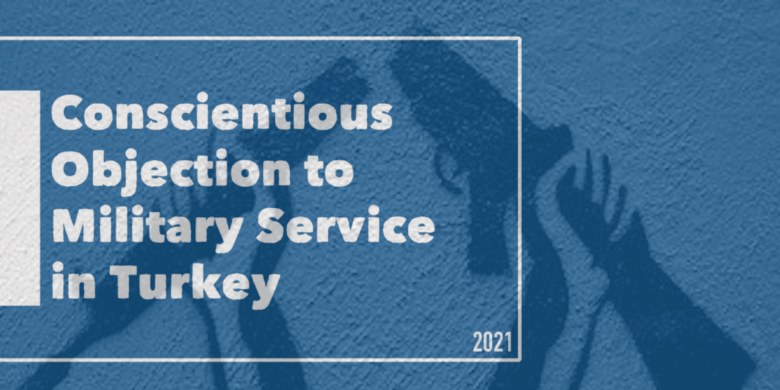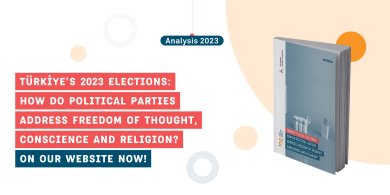“Conscientious Objection to Military Service in Turkey” report
"Conscientious Objection to Military Service in Turkey” report, published by the Association for Conscientious Objection, addresses the litigation processes and fundamental human rights violations related to the “civil death” experienced by conscientious objectors and offers recommendations.

“Conscientious Objection to Military Service in Turkey” report, published by the Association for Conscientious Objection, addresses the litigation processes and fundamental human rights violations related to the “civil death” experienced by conscientious objectors and offers recommendations.
The report, which was prepared by interviewing 18 conscientious objectors and lawyers working in the field, was authored by the Freedom of Belief Initiative Director Dr. Mine Yıldırım and the Association for Conscientious Objection Legal Coordinator Hülya Üçpınar. The report examines the cases of 85 conscientious objectors. Additionally, it includes information and stories from conscientious objectors including antimilitarists, Jehovah’s Witnesses, and those objecting based on their Islamic belief.
Highlights of the report:
- To date, conscientious objectors have made at least 45 separate applications to the Constitutional Court.
- The report found that conscientious objectors, whose cases are included in the report, have been fined a total of 575,517 Turkish Liras (approx. 55,815 Euros) combined.
- Conscientious objection in practice in Turkey leads to “civil death”. In other words, conscientious objectors face multiple violations, including their right to vote and to be elected, freedom of movement, right to education, freedom to work, and deprivation of civil rights, and aggravated execution, which are under fundamental rights and freedoms.
- As a party to both ECHR and ICCPR, Turkey is obliged to protect the right to conscientious objection to military service as a part of its commitments under international law. In addition, the protection provided to the freedom of religion and conscience under Article 24 of the Constitution and the supremacy granted to the provisions of international human rights conventions as per Article 90 of the Constitution constitute obligations on the right to conscientious objection to military service.
- Despite Turkey’s international and national human rights obligations, the right to conscientious objection is not recognized. Military service remains compulsory for men aged 20-41. Besides, conscientious objection to military service is not recognized as a right only in Turkey among the member states of the Council of Europe.
- In addition to the interference with the freedom of thought, conscience and religion of conscientious objectors, other human rights are also restricted. Once a conscientious objector to military service evades the draft or deserts the military public authorities identify them as evader or deserter. This status becomes part of the information linked to their national identity number and information. Furthermore, it has implications for the exercise of a number of human rights. In Ülke v. Turkey, the ECtHR had stated that “The clandestine life, amounting almost to ‘civil death’, which the applicant has been compelled to adopt is incompatible with the punishment regime of a democratic society”.
- Non-recognition of the right to conscientious objection leads to an endless cycle of stop & checks and associated fines, criminal prosecutions, and restrictions on a wide range of human rights.
The report includes recommendations to the Turkish Government for development of a fundamental legislation for conscientious objection, as well as to international human rights compliance monitoring mechanisms.
Recommendations to the Turkish Government:
- To recognize conscientious objection to military service as a constitutional right, without delay, to ensure that legislation on conscientious objection does not come into conflict with other legal regulations and that such regulation is not made open to, possibly restrictive, interpretations of the executive and judicial bodies;
- to draft a legislation on conscientious objection to military service in compliance with international human rights law as enshrined in the United Nations, the Council of Europe and the European Union human rights instruments;
- to establish an independent and impartial decision-making body to examine conscientious objection claims – in compliance with international human right law standards, in particular taking into account the requirement not to discriminate between conscientious objectors on the basis of the nature of their religions or belief;
- to take measures, that are compatible with international human rights law to provide a mechanism for the conscientious objectors who declare themselves as “total objectors”;
- to take measures to provide alternative service for those conscientious objectors who request it;
- to end all criminal proceedings against conscientious objectors, provide compensation and to expunge all convictions regarding conscientious objection in the criminal records for disobedience, draft evasion, desertion, public statements;
- to prepare official records in a detailed manner without missing information, in line with national procedures.
- to record, maintain and make accessible official records on the national database;
- to keep statistics on conscientious objection applications including the number of conscientious objectors, monetary fines and criminal investigations, and convictions delivered in connection to conscientious objectors and share with the public;
- to take measures to ensure that the applicants are free from the risk of further prosecution and obligation of compulsory military service and can fully enjoy their political, civil, economic, social and cultural right;
- to review domestic law, in particular the Law on Conscription, the Military Criminal Law, the Law on Civil Servants, Criminal Code, with a view to remove all restrictions imposed on conscientious objectors in the exercise of the rights to be elected and to elect, right to education, opportunities to earn a living.
The recommendations for international human rights compliance control mechanisms are summarized in the report as follows:
To United Nations human rights mechanisms,
- To keep compliance control of the right to conscientious objection to military service on relevant agenda including UN Human Rights Committee, UN Special Procedures and the UPR;
- To follow up the implementation of UN HRC Opinion on Atasoy and Sarkut v. Turkey and UPR recommendations.
To CoE Committee of Ministers,
- To keep the right to conscientious objection to military service on relevant agenda;
- to continue to keep the Ülke group of cases on enhanced supervision;
- to ask the Turkish authorities to report on the effectiveness of the Constitutional Court individual application mechanism to protect conscientious objectors to military service;
- to ask the Turkish authorities to provide information on how and to what extent the rights of conscientious objectors to education, security of persons, protection of property, right to vote and opportunities to earn a living are impacted due to evader/deserter status in law;
- to ask Turkish authorities statistical information on conscientious objectors to military service.
Please click here to access the full report.[1]
[1] To prepare this post, the article titled “‘Conscientious Objection to Military Service in Turkey’ Report is Released” by the Conscientious Objection Association was used as a resource.



